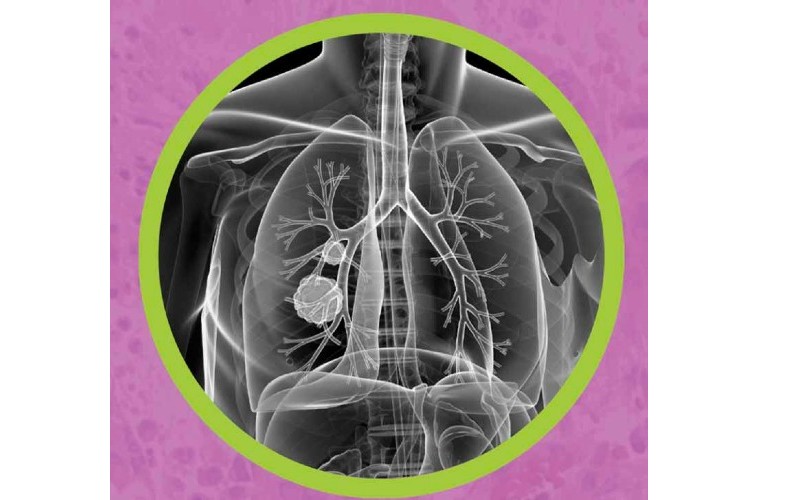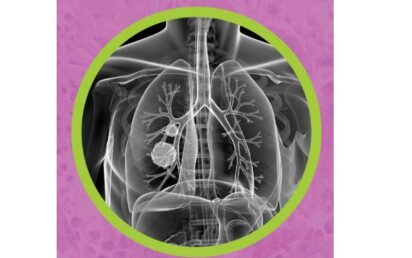Oxford-based Optellum has achieved FDA clearance for the application of artificial intelligence decision support in lung cancer diagnosis – described as a ‘world-first breakthrough’.
The HealthTech has been supported by partnerships with the NHS and funding from Innovate UK and the National Institute for Health Research (NIHR) for its clinical decision support software, Virtual Nodule Clinic.
Powered by AI, it gives clinicians support in identifying and tracking at-risk patients who present suspicious lung nodules which may or may not be cancerous, and making optimal clinical decisions.
By integrating a clinically-validated Lung Cancer Prediction (LCP) score based on imaging AI, the firm says it has the potential to improve clinical care coordination and decisions, with the aim to get patients treated before the disease has metastasised – crucially increasing lung cancer survival rates.
Lung cancer is the leading cause of cancer deaths in the UK, accounting for 21% of all cancer deaths in any one year. When diagnosed at an early stage, almost 57% of people in the UK with lung cancer will survive their disease for five years or more, compared with only 3% when the disease is diagnosed at the latest stage.
Currently, around three-quarters of lung cancer cases are diagnosed at a late stage in the UK.
https://businesscloud.co.uk/ai-tech-protecting-unborn-babies-acquired-in-42m-deal/
With funding provided through the Innovate UK and the National Institute for Health Research (NIHR) partnerships as well as EIT Health, Optellum’s researchers have been using wealth of clinical information including CT images to train a machine-learning neural network to recognise the signs of the deadly disease.
The Optellum technology has been developed and clinically-validated in partnership with several NHS hospitals – including Oxford University Hospitals NHS Foundation Trust, Nottingham University Hospitals NHS Trust, the Leeds Teaching Hospitals NHS Trust, and the Royal Brompton and Harefield hospitals – and brings British technology innovation to the forefront.
Physician use of Virtual Nodule Clinic is shown to improve diagnostic accuracy, clinical decision-making and consistency among physicians. The LCP AI has been extensively validated in multi-centre studies led by co-authors of clinical guidelines, and shown to consistently outperform conventional risk prediction models, currently recommended in clinical guidelines and considered state-of-the-art in classifying nodules as low, intermediate or high risk.
“The impact of the pandemic on lung cancer has been devastating – we have seen fewer diagnoses and more late-stage disease. It is imperative that we recover and diagnose more people at an early stage,” said Professor David Baldwin, Chair of the Clinical Expert Group for Lung Cancer at NHS England.
https://businesscloud.co.uk/27m-to-help-digital-surgery-healthtech-operate/
Prof Baldwin is also co-author of the current clinical guidelines for lung cancer in the UK and a Professor of Medicine and Consultant Physician at Nottingham University Hospitals.
“Very early stage lung cancer can be difficult to diagnose because it shows up on scans as small pulmonary nodules. These can be tricky to classify so we need better ways to confirm whether a nodule is lung cancer or harmless and quickly as possible,” he continued.
“Every day that a diagnosis is delayed diminishes a patient’s chances of survival. That is why my NHS colleagues – leading radiologists and pulmonologists – and I have teamed up with Optellum to develop and validate this imaging AI-based software.
“This will help identify and urgently prioritise referrals for patients with a genuine high-risk of cancer, speeding up time to the start of treatment, reducing unnecessary procedures on patients with benign lesions and saving NHS time and resources for those who ideally need them.”
Optellum was conceived in 2015 by Václav Potěšil and founded together with Lyndsey Pickup, Timor Kadir, Jérôme Declerck and Professor Sir Michael Brady, who met at the University of Oxford’s world-renowned computer vision laboratory.
To date the company has secured over £9 million in seed and government funding, including early-stage investments from St John’s College (University of Oxford), and the family office of Sir Martin & Lady Audrey Wood (founders of Oxford Instruments Plc, the first University of Oxford spin-out), later followed by investments from Luminous Ventures, IQ Capital and a number of private investors from the UK, Switzerland, Malaysia, Singapore, and Hong Kong.


